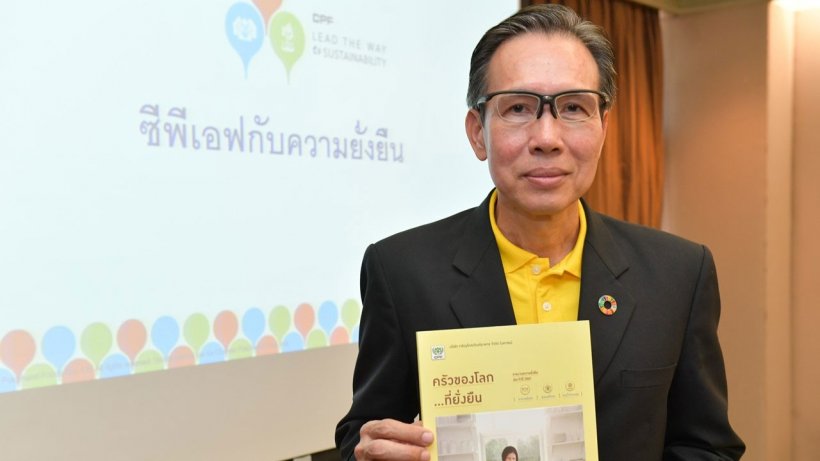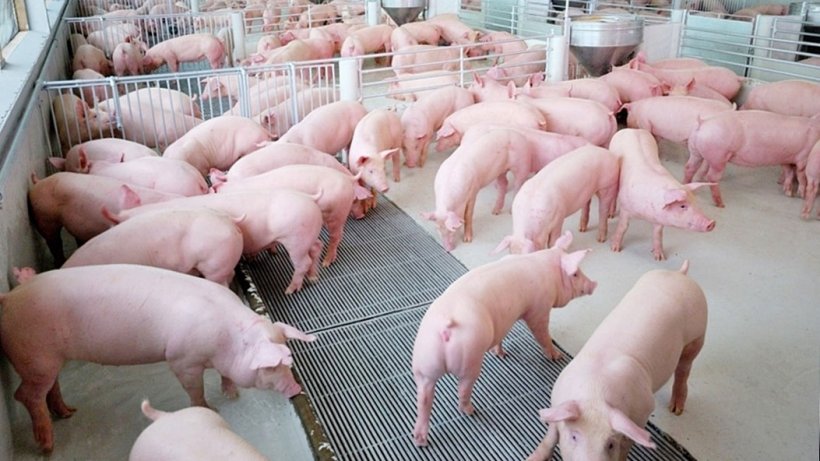 Mr. Wuthichai Sithipreedanant, senior vice president for corporate social responsibility and sustainable development, said the company’s sustainable target has been set in line with its “Kitchen of the World” vision and also focused on “Three Pillars to Sustainability Strategies” including Food Safety, Self-Sufficient Society and Balance of Nature. The strategies aim to ensure stakeholders’ demands on food quality, food safety, nutrition, animal welfare, responsible sourcing, and environmental footprints will be served.
Mr. Wuthichai Sithipreedanant, senior vice president for corporate social responsibility and sustainable development, said the company’s sustainable target has been set in line with its “Kitchen of the World” vision and also focused on “Three Pillars to Sustainability Strategies” including Food Safety, Self-Sufficient Society and Balance of Nature. The strategies aim to ensure stakeholders’ demands on food quality, food safety, nutrition, animal welfare, responsible sourcing, and environmental footprints will be served.
The company strives forward on its Animal Welfare Policy, Global Vision for Antimicrobial Use Stewardship in Food Animals, Sustainable Packaging Policy and Principle and environmental impact practices. It has already set up long-term target during 2025-2028 to encourage development on economy, social and environment in accordance with Sustainable Development Goals (SDGs) and the principles of the United Nations Global Compact.

He added that CP Foods is committed on animal welfare in business practices align with international standards and regulations of Thailand and trading partners. Particularly, the “Five Freedoms” principle has been applied in livestock farm, meat business and meat product.
The company has made significant transition on the animal housing to enhance animal welfare policy. Currently, 33% of sow's crates in Thailand’s operations are now group gestation pen. Meanwhile, the implementation at overseas sow farms is at 7%. The transition to group sow housing for both in Thailand and overseas operations will be completed within 2025 and 2028 respectively.

In chicken business, CPF tries a pilot project of the cage-free housing for layer chickens in Thailand last year which the production came out in March this year. Thailand’s broiler business operations already have Poultry Welfare Officer 100% since last year, two years ahead of the target. Moreover, the overseas operation had well performed to achieve 63% and targeted to complete goal by 2020. It is important to note that the company's broiler business in Thailand has adopted animal welfare principle since 2000.
The company launched “Global Vision for Antimicrobial Use Stewardship in Food Animals” to promote responsible and prudent use of antibiotics in line with World Health Organization’s “One Health” initiative.
To tackle antimicrobial resistance, the antibiotics are only be employed under veterinary oversight for therapeutic uses. Additionally, animal welfare principle is implemented to keep the animals in a healthy condition, reducing the need for antimicrobials.
Mr.Wuthichai pointed that the company is determined to develop sustainable packaging design and management based on the concept of Circular Economy throughout the value chain. The approach is intended to optimize resources used in the production of packaging, reduce packaging waste, and to promote the use of environmentally friendly packaging materials.
“We takes into account packaging use throughout the lifespan, from maintaining product quality, product protection during transportation, consumption, to post-consumer packaging management. In addition, the company has also developed food packaging to extend food product shelf life in order to help reducing unconsumed food waste,” Mr. Wuthichai explained.
CP Foods is attempted to source packaging that has recycled material containing in non-contact food packaging (Secondary Packaging) or, i.e., corrugated boxes. Those packaging have contained recycled material ranging from 70-100%.
For chilled raw chicken and pork products, the company developed bioplastic trays made from natural renewable resources, namely Polylactic Acid (PLA), which is compostable. It was the first company in Thailand to use such trays in chilled raw meat products.
In 2018, CP Foods could reduce more than 3.9 million PET trays or over 60 tons of plastic, which is equivalent to GHG emissions reduction of 132 tons CO2e per year.
CP Foods has made a commitment that 100% of its packaging to be reusable or recyclable or upcyclable or compostable by 2025 for Thailand operations and by 2030 for overseas operations.
He noted that the company continues to find a better way to reduce single use plastic bag consumption. The integrated broiler businesses have replaced plastic bags with stainless steel trucks to transfer products within the production processes.
In aquaculture business, CP Foods has replaced plastic bags with Q-Pass Tank to transport shrimp larvae to customers. Bulk Feed Tank has been used as an eco-friendly replacement in livestock feed business since 2013.
CP Freshmart has launched a campaign to encourage customers to reduce the use of single-use plastic bags. It is expected that this initiative will help reduce 5 million pieces of plastic waste a year.
Additionally, CP Foods’ sustainability report 2019 was printed with soy ink and on responsible sourced paper to make the report environmentally friendly in line with the company’s sustainability policies.
Note : The “Five Freedoms” includes 1. Freedom from hunger and thirst, 2. Freedom from discomfort, 3. Freedom from pain, injury or disease, 4. Freedom to express normal behavior, and 5. Freedom from fear and distress in order to provide the farming animals to express their natural behaviors under the animal housing independently.
May 24, 2019 - Charoen Pokphand Foods PCL (CP Foods)





